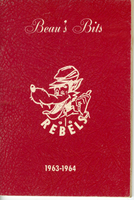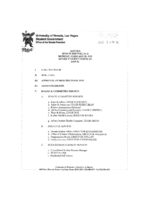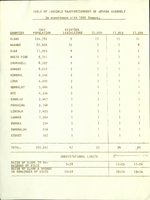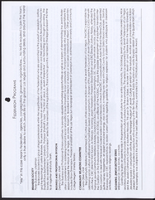Search the Special Collections and Archives Portal
Search Results
MGM Mirage Records on Mandalay Resort Group
Identifier
Abstract
The MGM Mirage Records on Mandalay Resort Group consists of materials from Mandalay Resort Group’s office of public relations and community affairs records, which was closed after Mandalay’s corporate merger with MGM Mirage in 2005. The files, dating from 1968 to 2005, provide documentation of Mandalay Resort Group’s external affairs and internal operations. They contain subject files, photographs, negatives, slides, correspondence, VHS tapes, corporate publications, press releases, press kits, wholesale room agreements, hotel ephemera, employee newsletters, and press clippings. Of particular interest are files and photographs documenting the planning, development, construction, and opening of the Mandalay Resort Group properties.
Archival Collection
Ronzone Family Papers
Identifier
Abstract
Ronzone Family Papers (1900-1991) include newspaper clippings, business documents, correspondence, certificates, yearbooks, publications, artifacts, and photographs. The papers document their lives in Nevada, their department store, and Dick Ronzone's involvement in local politics.
Archival Collection
Mesquite Club Records
Identifier
Abstract
The Mesquite Club Records (1911-2016) contain the organizational files of the Mesquite Club, the oldest women's service club in Las Vegas, Nevada. Materials include meeting agendas and minutes, correspondence, committee reports, newsletters, scrapbooks, and photographic prints and negatives. The records document the club's administrative structure, community service projects, social events, and relationship with the General Federation of Women's Clubs (GFWC).
Archival Collection

"Beau's Bits": Nevada Southern University Student Handbook
Date
Archival Collection
Mixed Content

Meeting minutes for Consolidated Student Senate University of Nevada, Las Vegas, February 28, 1995
Date
Archival Collection
Description
Text

Luceanne "Lucy" Taufa oral history interview: transcript
Date
Archival Collection
Description
Oral history interview with Luceanne "Lucy" Taufa conducted by Jerwin Tiu, Cecilia Winchell, and Stefani Evans on December 16, 2022 for Reflections: the Las Vegas Asian American and Pacific Islander Oral History Project. In this interview, Taufa describes growing up on the Tongan island of Vava'u in a large family and later immigrating to the United States. She recalls her father first immigrating to Hawaii, and after obtaining a green card, her and her siblings following shortly after. While Kaufa's older siblings continued to pursue higher education and her younger siblings were too young to work, she took on a bulk of the responsibility to provide income and navigate life in Hawaii for her family. Eventually, Lucy moved to Dallas, Texas, met her husband, and moved to Las Vegas, Nevada for her husband's job. Later in the interview, she discusses joining the Culinary Union after experiencing racial discrimination at her workplace and her pride in her identity as a Tongan woman.
Text

Legislative counsel bureau reports, sample apportionments, county populations and final apportionment for legislative reapportionment, 1965
Date
Archival Collection
Description
Group of documents dealing with the legislative reapportionment of the Nevada State Assembly based on population distribution.
Text



